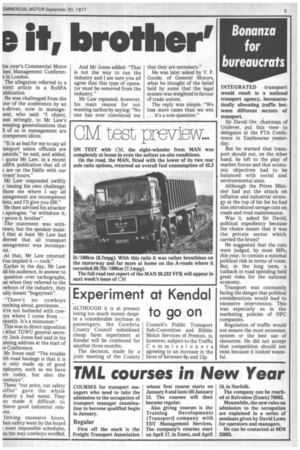Bonanza for bureaucrats
Page 7

If you've noticed an error in this article please click here to report it so we can fix it.
INTEGRATED transport would result in a national transport agency, bureaucratically allocating traffic between different sectors of transport.
Sir David Orr, chairman of Unilever, put this view to delegates at the FTA Conference in Eastbourne yesterday.
But he warned that transport should not, on the other hand, be left to the play of market forces and that economic objectives had to be balanced with social and environmental aims.
Although the Prime Minister had put the attack on inflation and industrial strategy at the top of his list he had also introduced savage cuts on roads and road maintenance.
Was it, asked Sir David, political expediency because the choice meant that it was the private sector which carried the brunt?
He suggested that the cuts were judged, by most MPs, this year, to contain a minimal political risk in terms of votes. But, in the long term, a cutback in road spending held great risks for the national economy.
Transport was constantly facing the danger that political considerations would lead to excessive intervention. This was especially so in the marketing policies of NFC companies.
Regulation of traffic would not ensure the most economic system or the best use of resources. He did not accept that competition should not exist because it looked wasteful.






































































































